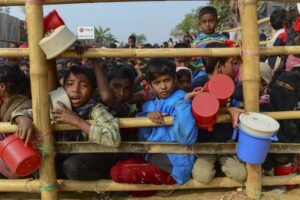The Rohingya crisis has all but receded into memory as far as Western financial commitments are concerned. The political process of the refugees’ repatriation back to their homeland now looks uncertain, especially with no slowdown in brutal crackdown on pro-democracy forces after the democratically-elected government was overthrown. With so much going on in that country in terms of turmoil and the West’s preoccupation with the war in Ukraine, the refugee crisis involving a million Rohingya people living in Bangladeshi camps seems to have taken a backstage.
Other than paying lip service about what a brilliant job Bangladesh and its government have done to save a people from deliberate persecution, the foreign powers have been depressingly stingy with their collective purses to fund this ongoing humanitarian crisis. It is now plain that funding is no longer on the priority list for the Rohingya refugees “who are almost fully dependent on food assistance”. While it may be politically expedient for Western powers to stop short of making funding available and simply sticking to diplomatic communiques about what the Bangladesh government should be doing for their healthy upkeep, it is time to set certain facts in order.
Several international organisations are working with the stranded Rohingya. Médecins Sans Frontières (MSF) states in a press release in March, 2023 that “cuts to the food rations received by one million Rohingya refugees in Cox’s Bazar district, Bangladesh will increase their risk of malnutrition and have a serious impact on their health.” That statement is further reinforced by MSF country representative in Bangladesh, who said that “Funding has gone down. Donors must reprioritise the Rohingya and reaffirm their funding commitments”.
MSF has cited that the World Food Programme (WFP) has been forced to cut rations by 17 per cent, “bringing the number of calories per person to below the accepted minimum standard of 2,100 calories per day.” Given that this population lives in congested camps and has no access to employment outside, there is no income generating opportunity. Hence this large community of the Rohingya is totally dependent on the food aid that foreign aid agencies pay for. The lower intake of calories is already manifesting into various health ailments. MSF, which operates in the refugee camps has observed issues like malnutrition and anemia, two conditions that weaken immune systems and open up the possibility of infectious diseases such as cholera and measles. Prolonged malnutrition could give way to more chronic ailments like heart disease, type II diabetes, etc. Evidently, ending up with a sick refugee population is going to put even a greater financial pressure on the host country as well as donors.
Desperate times call for desperate measures and members of this community are reportedly getting more involved with illicit activities such as drug and human trafficking. The spillover effect from drugs is decimating not just the district but is now a nationwide problem.
The WFP has issued an alert about funding shortages and this situation has been emerging over the last three months. Already stretched, the WFP will be forced to make further cuts in food assistance unless the organisation receives immediate funds. The numbers speak for themselves unfortunately. The WFP is now reducing the value of its “life-saving food vouchers from US$12 to US$10 per person per month.’ With the funding gap persisting, the WFP will have no choice but to ‘decrease the voucher value for a second time from US$10 to US$8”.
Indeed, the WFP’s general food assistance (GFA) is a lifeline for the Rohingya. So, cuts on the food budget are literally, a choice between a nutritious life or a life of malnutrition for these people. Things were bad enough before this forced downgrade in GFA. According to WFP data, presently 12 per cent Rohingya children are acutely malnourished and 41 per cent are chronically malnourished. If there is a 20 per cent cut on the individual life-saving voucher, the percentage of such children will simply be mind-boggling.
The appeal for a measly US$61 million in funding commitment is all that is needed to keep the voucher value at its current price. Unfortunately, that sum of money appears to be a lot for decision makers in foreign lands who have no problems calling on the Bangladeshi government to voice their concerns about relocating some of these refugees to an island facility built with modern amenities to house them and take care of them. That facility was built at a considerable expense. Now that Rohingya children are chronically malnourished, some bureaucrats in foreign lands have decided that it is okay for children to go hungry in refugee camps.
Please spare the sermons, and do what needs to be done to keep the dollars flowing. Food insecurity in those camps mean more trafficking of women, children and adolescent girls, more malnourishment of the young in particular. Talking about human rights and dignity must be backed up by financial commitments.

